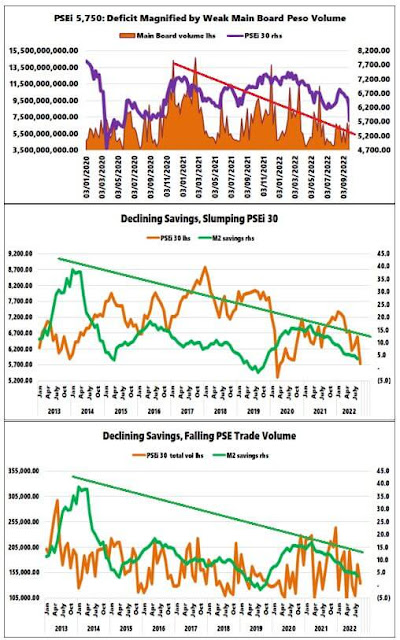PSE Liquidations Conditioned by Slowing Savings Growth, Low Volume, and Triggered by Stagflation
The PSEi 30 plummeted 8.3% over the week, the worst since March 2020, which exacerbated the deficit from the 6-week losing streak to 16.4%.
Reckoning by month, the headline benchmark posted a 12.8% loss in September, a scale last seen in June 2008 (13%). September 2022 deficit was the largest since 1990.
But the September deficit was better than the 21.6% contraction in March 2020 and the 24.1% crash in October 2008.
In any case, the last two episodes marked the climax of the bear market or the start of a crucial rebound (2020) and the incipience of a bull market (2008).
Nonetheless, while there may be some similarities, the conditions leading to the current climate have been starkly different.
The financial markets operate under a stagflationary environment.
Technically, with sellers in a rush, the persistent low trade volumes led to substantially lower bids. The depressed trading volume is a function of the slowing growth in M2 savings.
Further, foreign money exodus from domestic equity positions exacerbated the slump.
Market breadth was lopsidedly in favor of sellers.
The flag pattern breakdown pushed momentum traders to stampede for the exits.
Though the peso rallied, perhaps due to interventions by the BSP as the news reported that the President "monitored" the exchange rate, it was not enough to goad the buyers back.
Strikingly, the Philippine peso outperformed the region.
The continuing surge in treasury rates must be the critical factor for fund-raising liquidations. Yields of 1-month Treasury bills rose again this week.
It is not just in the markets. The strains are showing in the main street.
A subsidiary of a listed holding firm recently filed for a collection case against another listed energy firm, a subsidiary of the holding firm for which BDO recently filed a bankruptcy case but was "settled."
Last week, BPI announced it was putting into its umbrella its merger with Robinsons Bank, a JG Summit subsidiary. JGS recently sold a significant holding of its Meralco holdings to raise cash. Though partly through a share swap, this merger could also represent part of the fund-raising campaign for JGS via a "graceful departure."
While many see this as "bullish," it could herald escalating fragility within the industry.
The recent withdrawal of foreign banks Citi and ING from the retail/consumer markets also exhibits tensions in the banking system as exhibited by the slowing growth in deposit liabilities.
Since no trend goes in a straight line, one can expect a significant rebound from an extensively oversold market.
But a bounce is not a reversal.
Be careful out there.






No comments:
Post a Comment